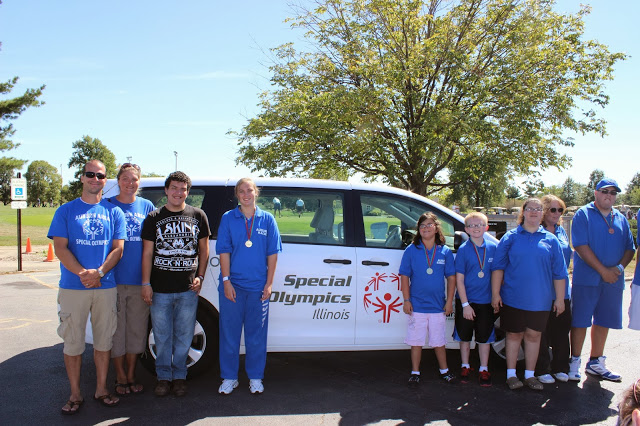This post is sponsored by Toyota’s philanthropy program 100 Cars for Good.
1. Tell me about what your charity does, and who it serves?
Our mission is to provide year-round sports training and athletic competition in a variety of Olympic-type sports for children and adults with intellectual disabilities, giving them continuing opportunities to develop physical fitness, demonstrate courage, experience joy and participate in a sharing of gifts, skills and friendship with their families, other Special Olympics athletes and the community. Our oath is: “Let me win. But if I cannot win, let me be brave in the attempt.”
2. How was the charity founded and why was it important to the founder?
Special Olympics began in Illinois with the first games at Soldier Field in July 1968 thanks to the efforts of Eunice Kennedy Shriver and her peers. Eunice Kennedy Shriver believed in justice. But, in the late 1950s and early 1960s, she saw little justice in the way people with intellectual disabilities were treated. She saw they were excluded and routinely placed in custodial institutions. They were often ignored and neglected, yet she knew they had many talents and gifts to offer.
Eunice Kennedy Shriver had a sister, Rosemary, who had an intellectual disability. She and Rosemary grew up playing sports together and with their family. The sisters swam, they sailed, they skied, they played football together. But in those days, there were limited programs and options for someone like Rosemary. Eunice Kennedy Shriver went on to become an athlete in college. She began to see that sports could be a common ground to unite people from all walks of life. There are now more than 4 million athletes in 170 countries. Special Olympics is financially sound with diverse revenue streams, a thorough annual budget process and increasing organizational revenue streams. Special Olympics Illinois does not charge athletes or their families to participate in the program.
3. What are some accomplishments you would like to share from the past few years? What are some goals you have for the future?
- 21,349 athletes (children and adults) with intellectual disabilities
- 12,966 Young Athletes ages 2-7 with and without intellectual disabilities
- 40,000 volunteers and coaches
- 170 competitions each year
- 19 Olympic-type sports
- Programs in 18 Areas, each coordinated by an Area Director and a volunteer committee
- Dynamic sports and corporate partnerships
Our goals for the Special Olympics include delivering high-quality training and competition in an inclusive culture that stresses athletic excellence, rewards determination, emphasizes health and celebrates achievement, promoting the overall well-being of people with intellectual disabilities via programs that ensure ongoing access to quality, community-based health care services, equipping young people and adult influencers with effective tools and training to create sports, classrooms and community actions that produce friendships and acceptance, driving positive attitude and behavioral change, and marshaling resources, implement diverse programming and act as a convening power of stakeholders to drive positive attitudinal and behavioral change toward people with intellectual disabilities in communities statewide, strengthening the fabric of society.
4. Which Toyota car did you choose? On a typical day, how do you use it?
This post is sponsored by Toyota’s philanthropy program 100 Cars for Good. Starting October 1 and ending November 19, do your own good deed by voting for your favorite organizations and causes on the 100 Cars for Good Facebook App.

